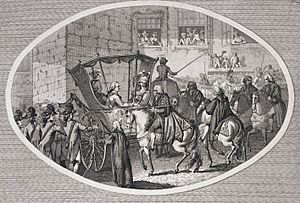William Pickett (alderman) facts for kids
William Pickett (died 1796) was an important English goldsmith and politician. He lived in the 1700s and became the Lord Mayor of London in 1789. This was a very important job in the city!
Contents
William Pickett: A Master Goldsmith
William Pickett started his career as a goldsmith in 1758. His shop was located on Ludgate Hill in London.
Early Business and Partnerships
At first, Pickett was a partner in a company called Thead & Pickett. From 1768 to 1777, he ran the business by himself. Later, in 1777, a man named Philip Rundell joined him. Their company was then known as Pickett & Rundell.
Changes in the Goldsmith Business
In 1786, Philip Rundell bought out William Pickett's share of the business. About a year later, the company became Rundell and Bridge. This new company grew to be one of the most famous goldsmiths in London for the next 50 years!
William Pickett: A London Politician
William Pickett was also active in London's local government. He worked to improve the city for its people.
Becoming an Alderman and Lord Mayor
In 1783, Pickett was chosen as an alderman for Cornhill Ward. An alderman is a senior member of a city council. He was part of the Whig group in London's Court of Alderman. This group often disagreed with the government led by William Pitt the younger in the 1790s.
In 1789, William Pickett became the Lord Mayor of London. This is a very important leadership role for the city.
Working for City Improvements
As a politician, Pickett tried to make London better. In 1787, he worked to have Temple Bar removed. This was a old gate that blocked traffic. He wanted to widen the streets for easier travel. However, this plan did not happen.
Pickett did succeed with another project near the Strand. This project created a new street. For a short time, it was called Pickett Street after him. But soon, people went back to calling it the Strand. This new development was later taken down in 1870. It made way for the Royal Courts of Justice, which are still there today.
Running for Parliament
After being Lord Mayor, Pickett decided to run for Parliament in 1790. He wanted to represent the City of London. However, he did not have a strong political group supporting him. He came in last place in the election. He tried again in 1796, speaking out against certain new laws. But he was not much more successful that time.
Death
William Pickett passed away in 1796. He was buried in his family's burial place in Stoke Newington on December 24, 1796.
Family Life
William Pickett was married to Elizabeth Pratten. Some records also suggest he married the daughter of his first business partner, Thead.
 | Bayard Rustin |
 | Jeannette Carter |
 | Jeremiah A. Brown |


